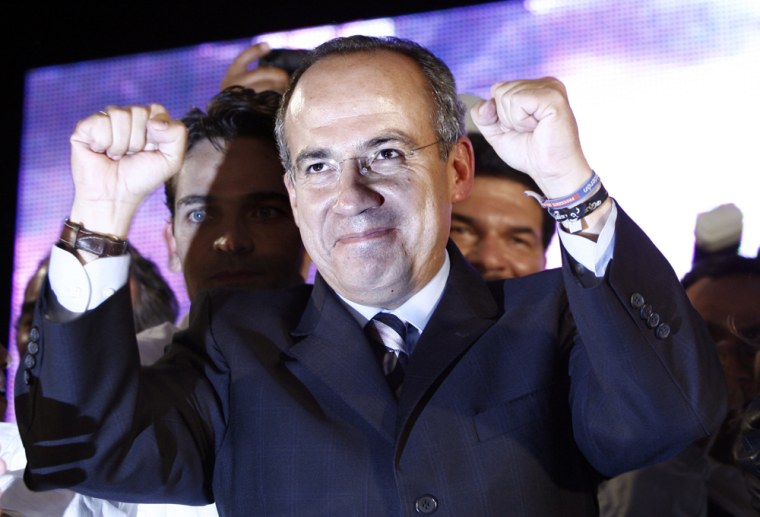This south-of-the-border presidential election has many of the trappings of the Bush vs. Gore electoral mess in Florida six years ago. Four days after the polls close, officials announce a winner in a tightly contested race where the margin of victory is just over 230,000 votes out of 41,791,322 cast. But then, the loser demands a recount and says he's going to court to get it.
Ironically, some Mexicans believe that the close victory of pro-business conservative Felipe Calderón over his leftist adversary Andrés Manuel López Obrador is actually a sign democracy is working in a country where truly competitive and honest presidential elections are a fairly recent development.
"Mexico's election system has borrowed the best and the worst of American politics," said Professor Denise Dresser, who teaches political science at of Mexico City's Autonomous Technological Institute, noting that the campaign was marked by greater transparency than past Mexican presidential races, but also by plenty of mudslinging from both sides.
And it could get nastier in the days to come. López Obrador, a fiery orator who campaigned as the poor peoples' champion, is calling for his followers to take to the streets to protest the outcome of the election.
At the bare minimum, the election has deeply polarized Mexico: rich against poor, left against right, north against south, urban against rural. An official of López Obrador's political party denounced the election process as "lamentable for democracy." And many here worry that the protests against the outcome of the election could take a violent turn as the López Obrador supporters vent their anger.
‘Golden rule of democracy’
After the independent Federal Electoral Institute announced the final vote tabulation, Calderón appealed for calm. "There are no victories in a democracy if there is no peace," he said, "and peace is the true victory in the life of a nation."
"We're facing a situation in which at least one-third of the country feels that their candidate won," said political analyst Ana Maria Salazar, a former Clinton Administration official, "And the other half think the election was stolen."
But Electoral Institute President Luis Carlos Ugalde defended the legitimacy of Calderón's narrow victory. "The golden rule of democracy," he said, "is that the candidate who gets the most votes wins."
Calderón won with only 35.89% of the vote, just over half a percentage point ahead of López Obrador. Assuming that all the challenges to Calderón's victory are swept aside, a process that could last from now until September, he'll still have a tough time establishing himself as a strong leader in a country where the Congress is divided among three major parties and half the voters think the wrong guy won.
In his victory speech, he said, "To those who voted against me, I ask them to give me the opportunity to earn their trust as the president of all Mexicans."
The Harvard-educated Calderón, who comes across as somewhat stiff and wonkish, is from the right-of-center National Action Party. That's the party of incumbent President Vicente Fox, whose victory in the year 2000 marked the beginning of truly contested presidential races in Mexican politics after 71 years of one party rule. (Under Mexican law, the president serves for a single six-year term.)
Fox, who, like Calderón, favors free markets and trade liberalization, found many of his initiatives blocked by opposition members of the Mexican Congress. His administration failed to create as many new jobs in Mexico as it promised. Fox had hoped to negotiate a program with the United States to permit Mexican guest workers north of the border, but September 11th dashed those hopes amid mounting American concerns about homeland security. Calderón may face many of the same frustrations as he seeks to build on what Fox started.
His opponents have labeled Calderón as a lackey of the rich, an attack that resonates with Mexico's poor people. "He represents the continuity of a model that has not provided them with an opportunity for social mobility," said political scientist Dresser. "And that is why you have so many migrants crossing the border in search of things they cannot find at home."
Living on less than $5 a day
Mexico is a country where almost half the people live on less than $5 a day, something that Calderón acknowledged as he spoke to his followers: "I reiterate my commitment to work tirelessly to overcome the poverty in which millions of Mexicans live," he said.
On the issue of migrants crossing into the United States illegally, Calderón has labeled it a problem for Mexico that needs to be eased by improving the economy at home. He has also called for the United States to treat illegal immigrants in a more humane manner, condemning the sending of National Guard troops to the border and plans to build more border fences.
Calderón has said he looks forward to working with U.S. President Bush on this and other issues, but told the Financial Times of London that his first foreign visit will most likely be to another Latin-American country, rather than the United States.
For the time being, though, his focus will be at home, trying to establish his legitimacy and healing the wounds of a nasty and still disputed political race.
George Lewis is an NBC News correspondent and Cecilia Alvear is an NBC News producer.
